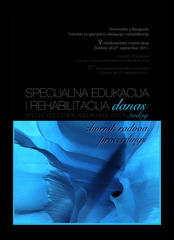Provera mogućnosti primene inventara depresivnosti mladih na uzorku beogradskih srednjoškolaca oštećenog sluha
Checking if children’s depression inventory (cdi) is adequate to be used on a sample of high school students with hearing impairments from Belgrade
| dc.contributor | Glumbić, Nenad | |
| dc.contributor | Vučinić, Vesna | |
| dc.creator | Dimoski, Sanja | |
| dc.creator | Radovanović, Vesna | |
| dc.creator | Stojković, Irena | |
| dc.creator | Karić, Jasmina | |
| dc.date.accessioned | 2022-04-26T11:34:46Z | |
| dc.date.available | 2022-04-26T11:34:46Z | |
| dc.date.issued | 2011 | |
| dc.identifier.isbn | 978-86-6203-029-0 | |
| dc.identifier.uri | http://rfasper.fasper.bg.ac.rs/handle/123456789/4428 | |
| dc.description.abstract | Emirijsko istraživanje ličnosti osoba oštećenog sluha prati niz metodoloških teškoća. Neke od ovih teškoća vezane su za nemogućnost osoba oštećenog sluha da dovoljno dobro razumeju i odgovore na verbalni testovni materijal. Cilj rada je provera mogućnosti Inventara depresivnosti mladih kada se koristi na uzorku beogradskih srednjoškolaca oštećenog sluha. Ovaj instrument (Kovacs, 1985., 1992.) je široko primenjivan u Evropi i Americi. U našoj sredini, ovo je prvi pokušaj primene ovog insrumenta na nekoj kategoriji dece i adolescenata sa ometenošću. Istraživanje je sporvedeno na uzorku od 51 ispitanika, učenika Srednje škole za obrazovanje omladine oštećenog sluha „Stefan Dečanski“ u Beogradu. Inventar depresivnosti, koji je sačinjen od pet subskala, zadavan je individualno uz prevod verbalnog materijala gestovnim jezikom. Procenjivana je pouzdanost instrumenta izražena preko unutrašnje konzistentnosti Kronbahovim alfa koeficijentom ( 0.673 ), kao i pouzdanost subskala (raspoloženje 0.500; samopouzdanje 0.712; neuspešnost 0.306; nezadovoljstvo 0.299; socijabilnost 0.089;). Rad se bavio i utvr�����ivanjem korelata depresivnosti. Utvr�����ena je statistička značajnost pola (p<0.05) kao korelata depresivnosti na subskali neuspešnosti statističkim posupom ANOVA. Utvr�����ivane su i korelacije izme�����u vrednosti dobijenih na subskalama (Pirsonovim koeficijentom korelacije). Zaključak rada govori o vrednom potencijalu Inventara depresivnosti mladih, ali i o nužnom daljem izučavanju njegovih metrijskih karakteristika na našoj populaciji, kao i potrebe za modifikovanjem. Ovaj rad predstavlja metodološki doprinos izučavanju ličnosti osoba oštećenog sluha u našoj sredini. | sr |
| dc.description.abstract | Empirical research of deaf personality follows a series of methodological difficulties. Some of these difficulties are related to the inability of persons with impaired hearing to sufficiently understand and respond to verbal test material. The aim of this paper is checking if Children’s Depression Inventory is adequate to be used on a sample of high school students with hearing impairments from Belgrade. This instrument, invented by Kovacs (1985, 1992) is widely applied in Europe and America. In our context, this is the first attempt to apply this instrument to a category of children and adolescents with hearing disabilities. The study is conducted on a sample of 51 subjects - students of schools for young people with hearing impairments "Stefan Dečanski" from Belgrade. Depression Inventory, which consists of five subscales, was used individually, and translated fom verbal into sign language. Reliability of the instrument is assessed through internal consistency expressed by Cronbach alpha coefficient (0.673), as well as reliability of subscales (mood 0.500; self esteem 0.712; ineffectual; 0.306, anhedonia 0.299, social 0.089). The paper also deals with the determination of depression correlates. Statistical significance of gender (p<0.05) as a depression correlate on the subscale of failure is established by using ANOVA statistical method. Correlations between values obtained on the subscales (Pearson's correlation coefficient) are also determined. The conclusion of the paper discusses the potential of Children’s Depression Inventory, but also - the necessity to further study its metric characteristics of our population, determining the factor analysis, as well as the need for modifying. This paper presents a methodological contribution to the study of deaf personality in our community. | sr |
| dc.language.iso | sr | sr |
| dc.publisher | Univerzitet u Beogradu – Fakultet za specijalnu edukaciju i rehabilitaciju/ University of Belgrade – Faculty of Special Education and Rehabilitation | sr |
| dc.relation | info:eu-repo/grantAgreement/MESTD/Integrated and Interdisciplinary Research (IIR or III)/47015/RS// | sr |
| dc.rights | openAccess | sr |
| dc.rights.uri | https://creativecommons.org/licenses/by-sa/4.0/ | |
| dc.source | Zbornik radova - 5. Međunarodni naučni skup „Specijalna edukacija i rehabilitacija danas“, Zlatibor, 24-27. septembar 2011 | sr |
| dc.subject | inventar depresivnosti | sr |
| dc.subject | srednjoškolci oštećenog sluha | sr |
| dc.subject | pouzdanost instrumenta | sr |
| dc.subject | korelati depresivnosti | sr |
| dc.subject | depression inventory | sr |
| dc.subject | high school students with hearing impairment | sr |
| dc.subject | the reliability of the instrument | sr |
| dc.subject | correlates of depression | sr |
| dc.title | Provera mogućnosti primene inventara depresivnosti mladih na uzorku beogradskih srednjoškolaca oštećenog sluha | sr |
| dc.title | Checking if children’s depression inventory (cdi) is adequate to be used on a sample of high school students with hearing impairments from Belgrade | sr |
| dc.type | conferenceObject | sr |
| dc.rights.license | BY-SA | sr |
| dc.citation.epage | 517 | |
| dc.citation.spage | 512 | |
| dc.identifier.fulltext | http://rfasper.fasper.bg.ac.rs/bitstream/id/7401/Untitled68.pdf | |
| dc.identifier.rcub | https://hdl.handle.net/21.15107/rcub_rfasper_4428 | |
| dc.type.version | publishedVersion | sr |


